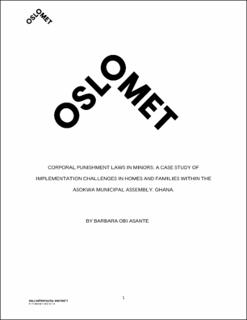CORPORAL PUNISHMENT LAWS IN MINORS: A CASE STUDY OF IMPLEMENTATION CHALLENGES IN HOMES AND FAMILIES WITHIN THE ASOKWA MUNICIPAL ASSEMBLY, GHANA.
Master thesis
Published version
Permanent lenke
https://hdl.handle.net/11250/3097541Utgivelsesdato
2023Metadata
Vis full innførselSamlinger
Sammendrag
The study examines corporal punishment laws in minors. A case study of implementation challenges in homes and families within the Asokwa Municipal Assembly. The study is guided by the following research objectives: examining the extent to which socio-cultural factors influence the implementation of corporal punishment laws in Ghana, assessing the methods of punishment meted out to children in Ghana, analyzing the extent to which laws are made available, and accessible to parents/guardians in Ghana and identify other forms of punishment that can be used in place of corporal punishment. The study employed an exploratory research design. The use of exploratory research design enabled me to explain and describe the issues related to corporal punishment. This study employed a qualitative research approach. Primary data was the main source of data. An interview guide was designed to solicit responses from the 8 respondents selected for the study. The study concludes that all the respondents have adequate knowledge about corporal punishment in the organization. The study further concludes that corporal punishment involves smacking, slapping, spanking children with sticks, belts, or biting children as well as forcing them to stay in an uncomfortable position. The study recommends that parents should spend quality time with their children at home, show them love and teach them good values so as to be disciplined. School authorities and teachers should also serve as role models so that, students can rely on them for advice and directions on how to make informed decisions in their education, social and other aspects of their lives. There is the need for Ghana to formulate and adopt a policy that specifically addresses the issue of corporal punishment. State agencies to be responsible for implementing these corporal punishment policy interventions must be well equipped with the needed capacity and resources to carry out this role as current.
